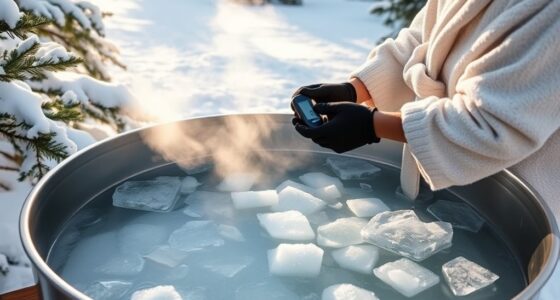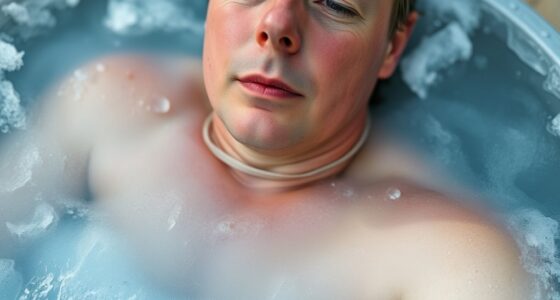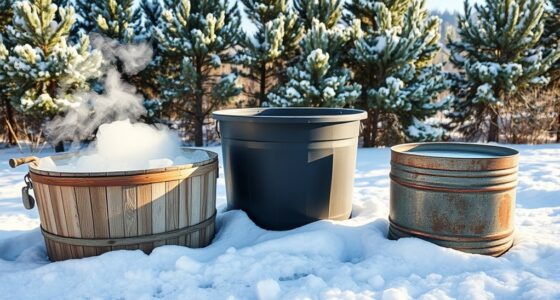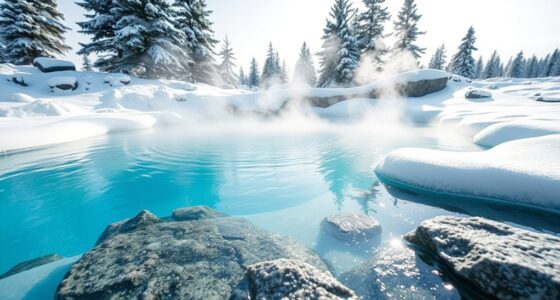Cold plunge therapy can boost your sleep quality by calming your nervous system and reducing stress hormones like cortisol. The cold exposure stimulates endorphin release, helping you feel more relaxed, while also promoting better recovery and reducing soreness that might interfere with rest. Over time, regular dips may enhance sleep depth and overall restfulness. Keep exploring how consistent cold plunges could transform your sleep and overall wellness with simple, effective techniques.
Key Takeaways
- Cold plunges promote relaxation and lower cortisol, helping to prepare the body for restful sleep.
- Regular cold exposure boosts sleep quality by reducing residual soreness and muscle tension.
- Immersion in icy water stimulates endorphin release, improving mood and easing bedtime anxiety.
- Cold therapy enhances sleep depth by supporting hormonal balance and circadian rhythm regulation.
- Incorporating cold plunges into bedtime routines fosters mental calmness and consistent sleep patterns.

Cold plunge therapy involves immersing your body in icy water to boost recovery, improve circulation, and enhance mental clarity. When you step into that freezing water, you activate a series of responses in your body that can substantially impact your mental health benefits and athletic recovery. This exposure to cold is not just about physical resilience; it also helps reduce stress and anxiety levels, making it easier for you to unwind and relax. The invigorating shock of cold water stimulates your nervous system, releasing endorphins that elevate your mood, which can lead to better sleep quality over time. Incorporating cold plunge therapy into your routine can also introduce you to focused recommendations, helping you optimize your wellness practices more effectively.
For athletes, cold plunge therapy is a game changer. It accelerates athletic recovery by reducing inflammation and muscle soreness after intense workouts. When you immerse yourself in cold water, blood vessels constrict, which helps flush out metabolic waste products and decreases swelling. As your body warms up afterward, blood flow increases, delivering oxygen and nutrients to your muscles more efficiently. This rapid recovery process allows you to train more consistently and with less discomfort, ultimately leading to improved sleep, since your body isn’t battling residual soreness or pain during rest.
Beyond physical benefits, cold plunges can positively influence your mental state, which is vital for sleep health. Regular exposure to cold water can help regulate your nervous system, lowering cortisol levels that are associated with stress. When stress diminishes, your mind tends to relax more easily, making it easier to fall asleep and stay asleep throughout the night. Cold plunges also promote a sense of accomplishment and mental resilience, as you learn to tolerate discomfort and push through the initial shock. This mental conditioning can transfer into your nightly routine, encouraging a calmer, more centered mindset before bedtime.
Incorporating cold plunge therapy into your routine doesn’t require a complicated setup. Even a quick dip after a workout or during your morning routine can provide noticeable benefits. Consistency is key; over time, you’ll notice your sleep quality improving, with deeper, more restorative rest. This enhancement in sleep isn’t just about feeling rested—it supports your overall health, hormonal balance, and cognitive function. As you become accustomed to the cold, you’ll also find that your mental clarity sharpens, giving you a more focused and alert mindset during the day and a more peaceful, restful sleep at night. Cold plunge therapy isn’t just a fitness trend; it’s a powerful tool to support your mental, physical, and sleep health.
Frequently Asked Questions
How Long Should I Stay in a Cold Plunge for Optimal Sleep Benefits?
You should stay in a cold plunge for about 3 to 5 minutes to get ideal sleep benefits. Follow the duration guidelines to avoid discomfort and guarantee safety. The best time to do this is about an hour before bed, as it helps lower your core temperature and signals your body to prepare for sleep. Keep the session short and consistent for the best results.
Are There Any Risks or Contraindications for Cold Plunge Therapy?
You should be aware that cold plunge therapy carries some risks, especially if you have certain health conditions. Conduct a risks assessment and follow contraindication guidelines to guarantee safety. People with cardiovascular issues, Raynaud’s disease, or weakened immune systems should avoid cold plunges or consult a healthcare professional first. Always listen to your body, start gradually, and stop if you experience discomfort or adverse reactions.
Can Cold Plunge Therapy Replace Traditional Sleep Improvement Methods?
Cold plunge therapy can complement traditional sleep improvement methods like mindfulness meditation and herbal supplements, but it shouldn’t replace them. You benefit most when combining these techniques, as cold plunges may boost relaxation and reduce stress, helping you sleep better. However, relying solely on cold plunges might overlook other essential factors. To improve sleep holistically, incorporate mindfulness, herbal remedies, and healthy sleep habits alongside cold therapy.
What Is the Ideal Temperature for a Cold Plunge to Enhance Sleep?
You should aim for a cold plunge temperature around 50-59°F (10-15°C) to enhance sleep. This temperature helps regulate your body’s core temperature, promoting better sleep hygiene. When you immerse yourself in cold water at this range, your body responds by lowering its temperature, signaling your brain it’s time to rest. Consistently maintaining this ideal temperature supports peak temperature regulation and improves your overall sleep quality.
How Frequently Should I Incorporate Cold Plunge Therapy Into My Routine?
You should incorporate cold plunge therapy about three to four times a week, aligning with seasonal changes to support your mental resilience. Coincidentally, this frequency helps your body adapt gradually, enhancing your resilience to stress and temperature fluctuations. Regular plunges promote better sleep, mood, and recovery, so listen to your body’s responses and adjust accordingly. Consistency is key, and overdoing it might counteract the benefits, so find your ideal routine.
Conclusion
So, next time you’re struggling to catch some quality Z’s, consider giving cold plunge therapy a shot. It’s like turning back the clock on your sleep, rejuvenating your mind and body. Think of it as a modern-day elixir, just like the ancient Romans bathed in icy waters for vitality. Immerse yourself, stay consistent, and watch your sleep improve—your future self will thank you, and you’ll be sleeping like a true medieval knight in shining armor.









